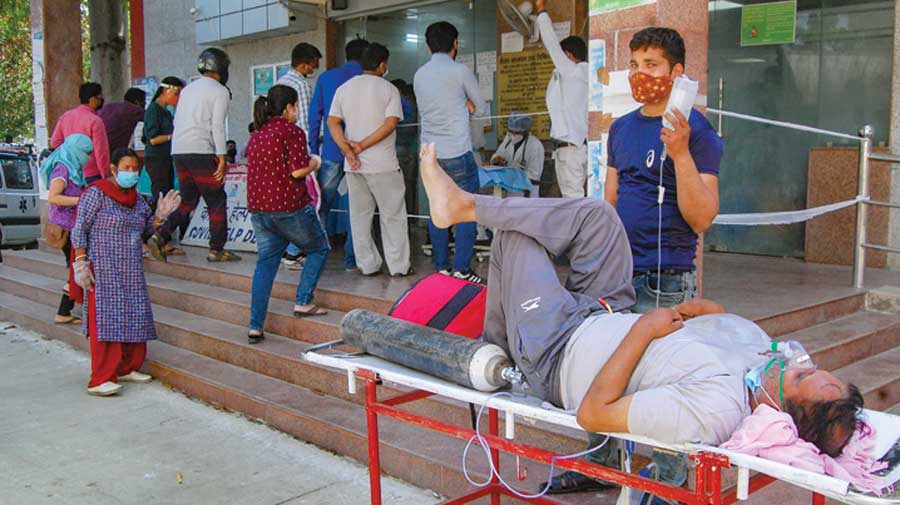⚫ People testing positive for Covid but staying home on self medication, fearing they would not get a bed
⚫ Covid patients turning critical but not getting beds for several days
⚫ A section of people still in denial and not getting tested despite having Covid symptoms
⚫ Violation of the treatment protocol by general medicine practitioners
More Covid patients are turning critical and dying in the second wave than the first and public health experts and doctors are citing the above reasons, along with the fact that the virus has gained in virulence, for the outcome.
The Covid critical care units in most private and government hospitals in Calcutta and its surrounding areas are full despite a steep rise in the number of beds compared with the peak of the epidemic last year, officials of several hospitals said.
Self medication
The crisis of beds is forcing relatives of many Covid patients to rush from one hospital to another in search of a bed. Doctors said that since people have come to know about the bed crisis, many patients are choosing to stay at home.
“These people, many of them elderly and with comorbidities, are apprehending that they would not get a hospital bed and so are getting treated at home. Many of them are not even consulting doctors and having medicines following prescriptions that are widely getting circulated on social media,” said Sauren Panja, the head of critical care and internal medicine at the RN Tagore International Institute of Cardiac Sciences.
“When someone is in home isolation, it’s a must to stay under the supervision of a doctor who can evaluate the patient’s condition regularly and decide when he or she needs to be admitted to hospital.”
Many such patients, despite having an oxygen saturation level far below 93 per cent, are staying at home on oxygen support. “Their condition has become critical by the time they reach hospital,” said Panja.
According to him, many people are taking steroids indiscriminately and that is causing harm to them.
“We give steroids to Covid patients judiciously. In many cases, steroids can bring down the patient’s immunity and allow the virus to replicate, leading to more severity. It can trigger other medical conditions like high blood sugar and other infections,” said Panja.
One steroid commonly used is dexamethasone, which doctors said should not be taken without medical supervision.
Other doctors said many patients coming to hospital had preferred to be at home rather than try for a hospital bed.
“There is a severe bed crisis and so many patients are not getting beds when required. But at least 10 per cent of the patients admitted under me were prescribed admission by local doctors but they preferred to stay at home with a false sense of security. This is opposite to what was happening during the first wave, when people out of panic were getting admitted even when there were no symptoms," said physician Chandramouli Bhattacharya, who treats Covid patients at Peerless Hospital.
Test reluctance
An 80-year old woman, who is a resident of Barrackpore, had a fever and her rapid antigen test for Covid was negative. Despite that, her oxygen saturation level dropped to below 80 on Wednesday night and family members took her to BN Bose Sub-Divisional Hospital.
“The doctors said she should be admitted and treated for Covid. They also suggested an RT-PCR test (a more confirmatory test for Covid). But some in the family refused to admit her to a Covid hospital saying she was not suffering from the disease and could get infected if admitted there,” said one of her grandsons.
She is now at home on oxygen support.
An elderly man, who had taken two doses of a Covid vaccine in April, has been running a temperature and suffering from a sore throat for four days. He visited the outpatients department of a private hospital on Thursday evening.
“When I asked him to get tested for Covid, he said he was fully vaccinated and was not getting exposed to the virus since he is hardly stepping out,” said the doctor who examined him.
Doctors and public health experts said reluctance to get tested was causing serious problems.
“The problem has increased this time compared to last year because many people have taken one or two doses of vaccines and have a sense of security. But the problem is there are people who are getting infected despite being vaccinated,” said Panja.
“If such people do not get tested despite being infected, they will spread the virus to others. Also, a delay of three to four days in getting tested is turning many patients critical,” he said.
Drug misuse
According to doctors treating Covid patients, a section of general medicine practitioners is still indiscriminately prescribing medicines to Covid patients and not suggesting hospital admission.
“Any doctor can treat Covid on a domiciliary basis because the government guidelines are in place. But the problem lies in the fact that in certain cases guidelines are not being followed and steroids are being prescribed indiscriminately, which can lead to problems,” said physician Chandramouli Bhattacharya.
“However, in many cases the doctors cannot be blamed. There are instances when
the doctor has advised admission but the patient is not getting a bed. So, the doctor is forced to go beyond the protocol and advise medicines,” he said.
Mismanagement
Health officials said at some government hospitals, doctors and authorities were not properly managing patients, which were leading to problems.
“At one government-run hospital I found all patients were provided with the same amount of oxygen support and the authorities were not bothered,” said Gopal Krishna Dhali, the coordinator of the Covid-19 management team of Bengal and the head of gastroenterology at SSKM Hospital.
“At another government hospital, I found departmental heads were not attending to Covid patients and so there was practically no evaluation,” said Dhali. This, he said, was the case in many other hospitals, resulting in patients turning critical.











